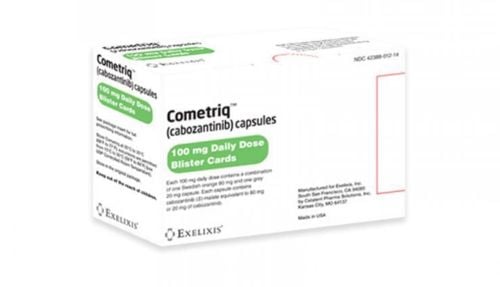This is an automatically translated article.
Enfortumab vedotin -ejfv is a drug manufactured in the form of a reconstituted solution, for intravenous use. The drug has been used in trials studying the treatment of tumors, cancer, and medical oncology. Follow the article to better understand the use of Enfortumab Vedotin-ejfv.
1. What is Enfortumab Vedotin-ejfv?
Enfortumab vedotin is an antibody drug conjugate (ADC) directed at Nectin-4 (an adhesion protein located on the cell surface). Nectin-4 is highly expressed in urothelial carcinoma as well as breast, stomach and lung cancers (Rosenberg 2019). It contains anti-Nectin-4 IgG1 antibody conjugated to the microtubule disruptor, monomethyl auristatin E (MMAE). MMAE is attached to the antibody via a protease-cleaved linker.
ADCs bind to Nectin-4-expressing cells to form a complex that is intracellular. Released MMAE binds to tubules and disrupts the cellular microtubule network, inducing cell cycle arrest and apoptosis of Nectin-4-expressing cells (Rosenberg 2019).
2. What does Enfortumab do?
Enfortumab Vedotin-ejfv is a monoclonal antibody that is bound to a chemotherapeutic agent called monomethyl auristatin E (MMAE) which is a microtubule inhibitor. This drug targets Nectin-4-positive carcinoma cells. Enfortumab Vedotin-ejfv attaches itself to the Nectin-4 receptor on cancer cells and pushes chemotherapy into the cells.
3. How to take Enfortumab Vedotin-ejfv
Enfortumab Vedotin-ejfv is given intravenously. Dosage is based on individual patient weight. The frequency of injections will depend on the patient for the doctor to decide.
Even when used carefully and correctly by a trained nurse, this medicine can cause burning sensation and pain. There is also a risk of drug leaking out of the vein during injection. at the injection site, resulting in tissue damage. If the injection area becomes red, swollen, or painful at any time during or after the injection, notify your doctor or nurse immediately. Do not apply anything to the application site unless directed to do so by your doctor or nurse.
Blood levels of this medicine may be affected by certain foods and medicines eg: grapefruit, grapefruit juice, Apalutamide, Atazanavir, Carbamazepine, Clarithromycin, Cobicistate, Darunavir, Dasabuvir, Enzalutamide, Fosphenytoin, Idelalisib, Indinavir, Itraconazole, Ketoconazoleone, Darunavir, Dasabuvir, Enzalutamide, Fosphenytoin, Idelalisib, Indinavir, Itraconazole, Ketoconazole, Lopinafirotane, Mitac Nevir, Mifeno, Pelfas, Milenovirotan , Phenytoin, Posaconazole, Rifavir, Primin and Riconazole number of other types. Be sure to tell your doctor about all medications and supplements you are taking.
4. Possible side effects when using Enfortumab Vedotin-ejfv
Here are some common side effects that are common in patients receiving Enfortumab Vedotin-ejfv injection:
4.1. Peripheral Neuropathy (Night or tingling in the hands or feet) Peripheral neuropathy is a toxic disease that affects the nerves. It causes numbness or tingling in the hands and feet, which usually occurs when wearing socks or gloves. This condition may get worse with additional doses of the drug.
In some people, symptoms will slowly go away after stopping the medication, but for some, it never goes away completely. Tell your doctor if you experience numbness or tingling in your hands and feet, as they may need to adjust the dose of the medicine accordingly.
4.2. Fatigue Fatigue is very common during cancer treatment and is a feeling of exhaustion that often doesn't go away with rest. During cancer treatment and for a while afterward, you may need to adjust your schedule to manage fatigue. Plan time to rest during the day and save energy for more important activities. Exercise can help fight fatigue
4.3. Skin changes Some patients may experience a rash, dry skin, or itching. In some cases, you may develop a very serious skin reaction, which may include blistering or peeling. These reactions are known as Steven Johnsons syndrome or toxic epidermal necrolysis.
Tell your doctor immediately if you have any changes in your skin. They should be able to tell you how best to take care of your skin depending on the extent of the reaction.
4.4. Decreased appetite or altered appetite Nutrition is an important part of caring for a sick person. Cancer treatment can affect appetite, and in some cases, side effects of treatment can make it difficult to eat. You can improve this in a few ways:
Try to eat five or six small meals or snacks throughout the day, instead of 3 larger meals. If you have anorexia, choosing nutritional supplements can be helpful. The person may experience a metallic taste or find that food has no taste at all. You may not even like foods or drinks that you enjoyed before cancer treatment. These symptoms may persist for several months or longer after treatment ends. Avoid any foods that have a bad smell or taste. If you have a problem with red meat, eat chicken, eggs, dairy products, and fish. 4.5. Hair loss Hair may become thin, break easily, or may fall out. This usually begins two to three weeks after starting treatment. This hair loss can be all over body hair, including pubic hair, underarm hair, legs, hands, eyelashes, and nose hair. Hair usually begins to grow back soon after treatment is complete.
4.6. Eye problems This medicine may cause changes to vision including blurred and dry. Patients can use eye drops to replace tears. Talk to your doctor if there are any changes in your vision.
4.7. Low red blood cell count (anemia) Your red blood cells are responsible for carrying oxygen to the tissues in your body. When your red blood cell count is low, you may feel tired or weak. You should let your cancer care team know if you experience shortness of breath, shortness of breath, or chest pain. If the count is too low, you may receive a blood transfusion.
4.8. Low white blood cell count (leukopenia or neutropenia) White blood cells (WBC) are important for fighting infections. While being treated, a person's white blood cell count may drop, making the risk of infection higher. You should notify your doctor or nurse immediately if you have a fever (temperature higher than 100.4°F or 38°C), sore throat or cold, trouble breathing, cough, burning when urinating, or pain when urinating. treatment. Tips to prevent infection: Frequent hand washing is the best way to prevent the spread of infection. Avoid contact with people who have a cold, fever or cough, or live with someone who has these symptoms. Do not handle pet waste. Keep all cuts or scrapes clean. Shower or bathe daily and perform regular oral care. You can paint your nails, but not fake nail polish. Less common, but other side effects that may occur when taking Enfortumab include:
High blood sugar : This medicine may increase blood sugar in patients with and without diabetes. If the patient feels thirsty, urinates or is hungry, has blurred vision, has a headache, or has a fruity breath, notify the treating physician. Diabetics should closely monitor their blood sugar and report increases to their doctor. Pneumonia: Patients may develop pneumonia while taking this medicine. Tell your doctor right away if you notice any new or worsening symptoms, including shortness of breath, shortness of breath, cough, or fever. Fertility: Exposure of an unborn baby to this drug may cause birth defects. Therefore, you should not become pregnant or father a child while taking this medicine.
Please dial HOTLINE for more information or register for an appointment HERE. Download MyVinmec app to make appointments faster and to manage your bookings easily.
Reference source: oncolink.org












